Get posts by email
A homeschooling high school math & science story
March 29, 2016
Celine is in her third year of high school, grade 11. This year has been very different from grade 10, which was different from grade 9. We continue, as we always have, to figure it out as we go.
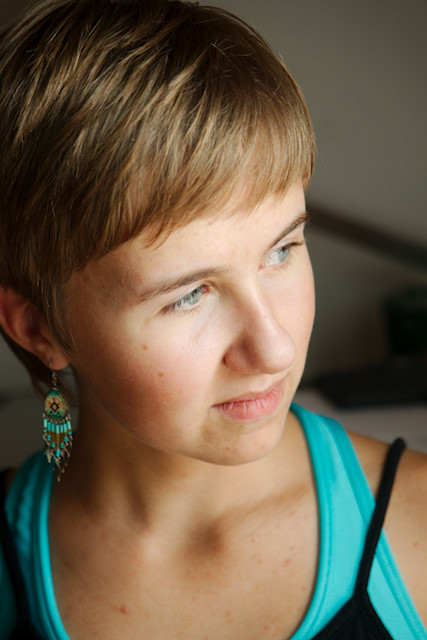
Like all my homeschool posts, this is a story of our family's experience. And in sharing our experience I hope to provide potential answers and inspiration about the following questions.
Can students succeed at high school level science with delayed math education and without elementary and junior high science courses? Ie: Can they do high school science having not followed the system in their younger years?
To tell the story of our experience with delayed math and "life" science education this post will also wind its way through the territory marked "my high schooler doesn't know what she wants to do after graduating".
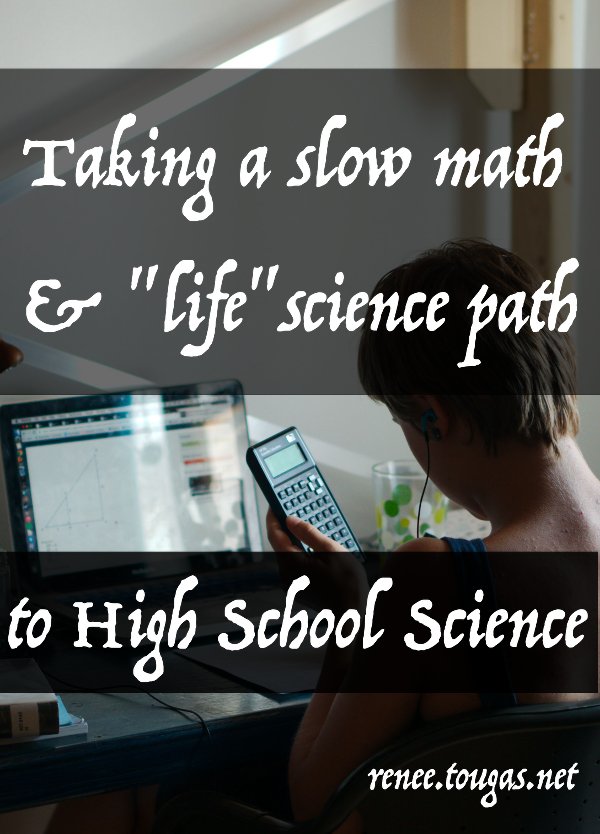
There's a lot packed into this post, so let's jump in.
Eight years ago, I published a post called Homeschooling Highschoolers. It was a tad ambitious perhaps as Celine was only nine years old, Laurent seven and Brienne was five. But it's amazing how many people ask "what about high school?" when they find out you're homeschooling. I wrote that post in response to that question.
Those were the Core Phase and Love of Learning Phase years. (Those links are to Simple Homeschool where Jamie Martin describes the phases of Leadership Education, a philosophy we loosely follow.)

my heart, eight years ago
One of my aims in homeschooling was to build a family culture and environment for learning in which we would all thrive and enjoy our days together. That's a tall order and so of course we don't always hit the mark, and life throws curve balls, but at least I know what I'm aiming for.
Homeschooling my young kids was especially enjoyable. The pace was relaxed, we had a lot of fun. We still have fun of course but we also work hard and have more outside-the-home obligations and commitments. The energy has shifted from relaxed and easy-going to more structured and intense.
I feel this shift is completely natural and right, but it's still a little disorientating for me sometimes.
None of that has to do with math and science except that, it kind of does, because I didn't do much of either with the kids when they were young.
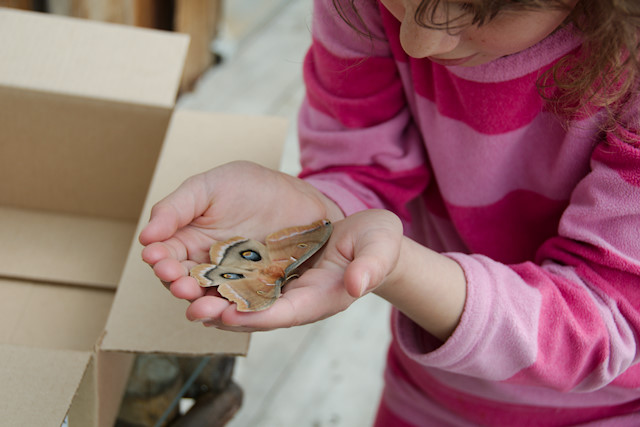
Like I wrote in that post I published eight years ago,
At this point with young ones our preferred curriculum is living books and our community...The people, places, art, culture, industries, museums, nature preserves, music and history unique to our area. These offer a wealth of learning and growth so we'll continue to tap the amazing resources in our community as our curriculum base.
The main academic skills I focused on in the Love of Learning years were reading, writing and math. But these were low-key endeavors. Reading was reading aloud to my kids and also teaching them to read. Celine caught on quick and was a voracious reader. The other two took quite a bit longer to learn.
I didn't use any packaged resources to teach writing, other than handwriting practice I didn't use workbooks. I roughly followed the The Brave Writer principles, emphasis on roughly. The kids wrote to communicate things, but there were no writing assignments in our home.

Math was always on the homeschool schedule but not always done in practice, and when we did do math, the lessons were "short & sweet".
My goal was not to complete the page but rather establish a familiarity with the ideas and practice using that part of our brains. We used different tools over the years, predominantly Math-U-See for early elementary and then one year of Teaching Textbooks later on. Our kids now use Life of Fred, Key To, and Khan Academy. Three kids, three different approaches.
But I have to tell you something, and I do so without any shame or embarrassment, our kids were always behind grade level in their math.
It wasn't important to me for them to be at grade level. We didn't do "the system" at home. We didn't track with the system either. I made our own curriculum, based on our values and who my kids were.
What was important was that the kids loved learning and that overall we were experiencing math concepts in our everyday life. I wanted math to be something very practical during the elementary years. And we weren't going to have tears over math.
I've talked about this before. There is a time for tears and frustration in formal learning but that time is not the early elementary years. To clarify, learners are always moving through frustration, it's an integral part of the learning process. Frustration is often the impetus for learning. Students will naturally experience a lot of frustration in self-directed projects and interest-driven learning. But in the elementary years or Love of Learning phase, I do not believe intense frustration should not be attached to academic lessons, unless the student is driving that experience.
It wasn't just my no-tears policy that slowed us down in math, it was life.
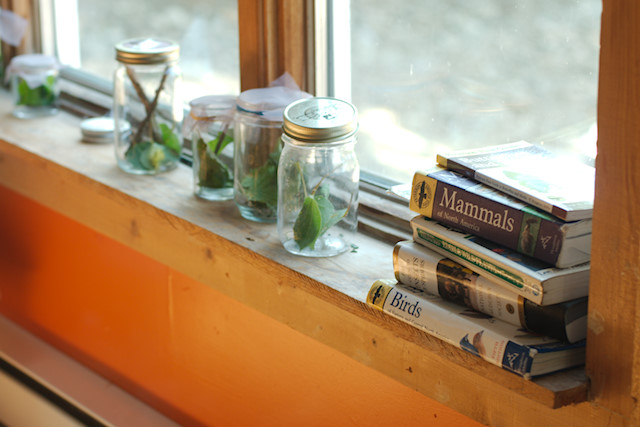
We lived by the seasons and if we were tired of lessons, we stopped. Brienne's birthday and American Thanksgiving in late November heralded a six week holiday season. There was mid-winter break for my own sanity. And when spring arrived, well forget about it, we spent as much time outdoors as possible. I also had other responsibilities and interests.
You get the picture. I just wasn't going to stress about keeping up with math in the bigger picture of our lives.
My philosophy was, and is, when they need to learn it, they will.
As for science, that was optional and self-directed; consisting mostly of nature study and backyard mucking about.
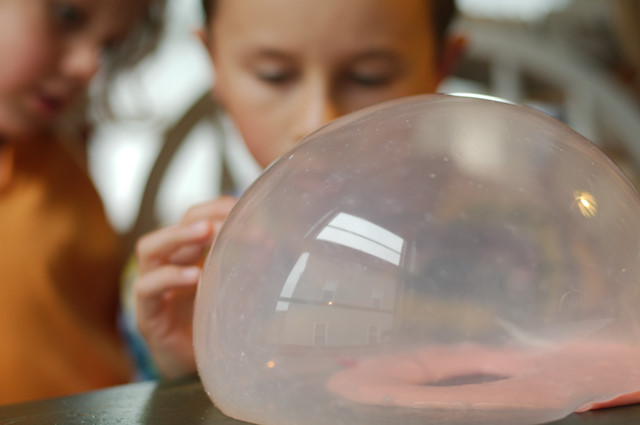
In the late elementary and early middle school years, roughly ages 10 through 13, I tried to do more science lessons with the kids. And I thought for sure as Celine was getting close to high school we needed to kick it up a notch in science.
Those plans were good for about two months, roughly October through November. And then science shifted back again into the realm of random videos, general reading, supper table discussions, more nature study and mucking about, with an increased focus on hands-on technology literacy.
We never made styrofoam models of atoms and molecules or jello molds of a cell, no volcanoes either. I bought a set of science experiment books that were never used. I bought the Story of Science (these are gorgeous books, I really like them), which has sadly met the same fate as the science experiment books.
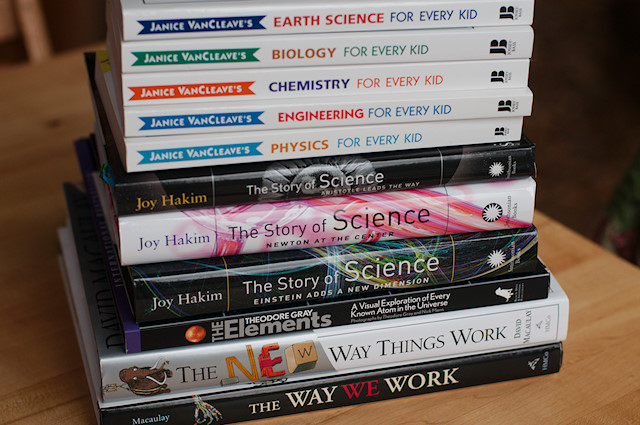
The one tool that has been used most regularly is our microscope.
I had good intentions but it turned out I wasn’t the kind of parent who could pull together any sort of consistency in science lessons. I could be consistent in other areas: setting up our home and schedule for interest-driven learning, being outdoors together, reading, teaching good habits, etc. but I couldn't pull off middle school science education.
Fast forward to high school.
I'm going to revisit my post from eight years ago, in which I cast a vision for homeschooling our high schoolers.
We plan to homeschool our kiddos till they graduate from high school. Our children can learn from home any subject taught in school and as they grow we have several options to choose from. Every subject imaginable is available to purchase as curriculum - math, sciences, art, music, second languages - you name it. And for those areas of study that you personally can't teach, like dance or calculus you can always find some person or program that can.
In their high school years we may mix in (depending on interest and need) some public school classes and first year college courses.
We fully expect that as they near teenager years they will have a better idea of types of work they would find meaningful as adults. As they identify those we will, as a family, tailor their education to prepare for a life of meaningful, industrious, satisfying and creative work. If their desires and interests require vigorous academics, so be it. Or maybe they'll be looking for apprenticeships and mentoring.
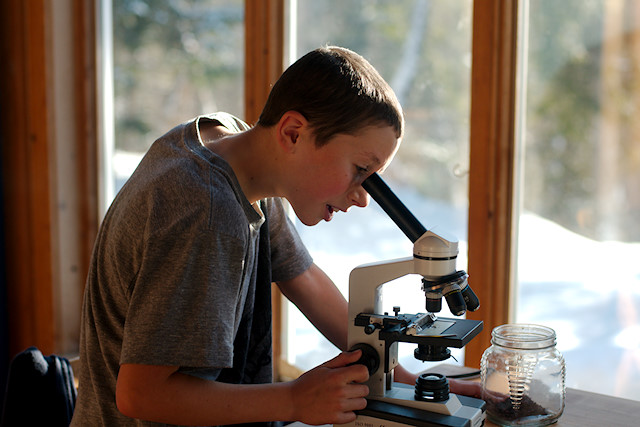
A lot of my student-motivated, interest-driven, parent-guided education philosophy ideas have played out pretty well for us. But not all my ideas have proven true.
We have a teenager, who is nearly seventeen, who does not have any solid ideas of the work she might want to do as an adult. Nor does she have post-secondary (Depth phase) education/work experience/travel goals yet.
This is actually a tall order for a lot of kids. I see that now. We don't emphasis or stress the importance of a college degree or post-secondary schooling. We feel there are many paths in life. We do not grill our kids about "what they want to be when they grow up".
We do however help them identity their gifts ands strengths (that's nothing new) and discuss with them possible work and study options. And this year at co-op they are taking a Personal Finance course which also addresses goal setting with regards to careers/jobs/vocations.
In the high school years self-awareness and self-knowledge is an actual element of the Tougas family curriculum, along with math, literature, science & technology, Bible & religion, history, homemaking, etc...
It's not that we don't talk about this stuff.
Even so, "I want to study this, do this, go here, explore this... when I'm done homeschooling" has not yet been a reality in our homeschool.
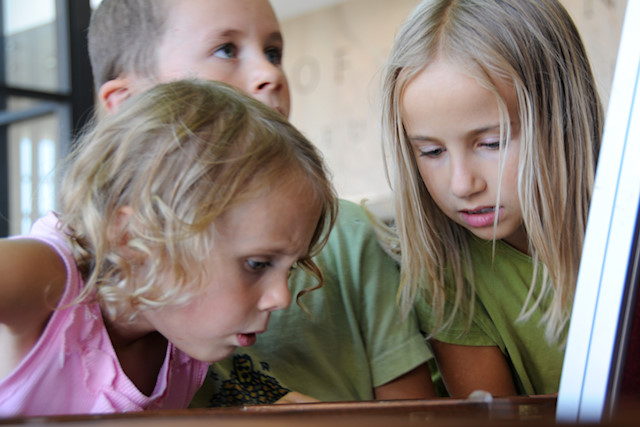
This puts a kink in my original intention to build a high school curriculum around our kids' post-secondary goals.
My plan for high school was to help our kids prepare for whatever they wanted to do after high school. To tailor their high school experience for the next stage. But if there isn't a plan or goal for post-highschool, I felt I needed to create a guideline or default curriculum.
This may not be necessary for each of our kids, but it was necessary for Celine.
I created this guideline for my sake as much as Celine's sake.
I need to know when my homeschooling job is done with each of our children.
Of course we'll still be guiding and helping them through their young adult years, as they ask, but at some point I will no longer be homeschooling them. I needed to define when we've arrived at that point with Celine.
So last summer, between Celine's 10th and 11th grade years, I drafted the Tougas High School Graduation Requirements plan. (By the way, this does not grant our kids' an accredited high school diploma. That will be addressed, eventually, in my Homeschooling Through High School series, but I'm willing to discuss in the comments if you like.)
This plan takes into account the student, the work they've already accomplished (in this case, the studies of Celine's 9th and 10th grade years), their natural interests and strengths, as well as crucial areas they may neglect without guidance.
Over the years I've created an overarching curriculum we follow for all our kids but the specifics are different for each child. The same is true with the Tougas High School Graduation Requirements; which may not even be necessary for Laurent or Brienne if they devise a plan of their own for their high school years, based on what they want to do post-secondary.
And now we can return to the math and science story.
I don't believe all students need to study the full complement of natural sciences - physics, chemistry, and biology - in high school (or middle school for that matter).
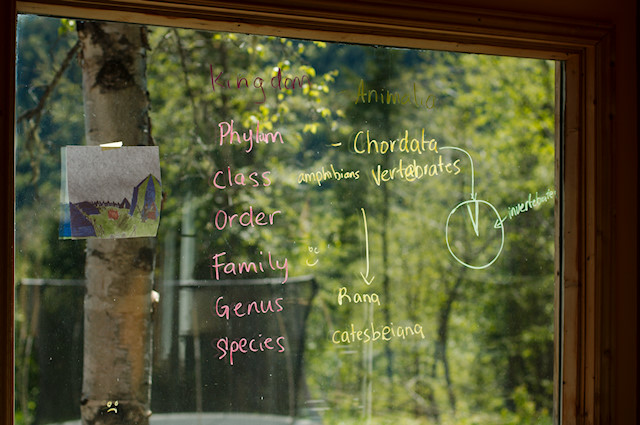
But without a clear goal in mind I wanted Celine to choose at least one of these and complete a course of study.
I know my daughter. Celine is a technically-gifted person. One of her intelligence types is logical-mathematical and both Damien and I recognized that certain sciences, physics especially, would suit her quite well.
The Tougas High School Graduation Requirements does not lay out how the material must be learned. I don't require a certain program, textbook, or resource to be used, that's up to the student, in this case Celine.
This year we are part of a homeschool co-op. Every year this co-op offers a different high school level science class, taught by a knowledgeable tutor. They use the Apologia materials.
Last summer when I saw that the co-op would be offering Exploring Creation with Physics, I presented the option to Celine that she could take the course to fulfill her science requirement. It was completely optional, she could have chosen to work through a Khan course if she wanted, but the appeal of studying with other students and a ready-made program influenced her choice towards joining the course.
There are no high school level math requirements in the Tougas High School Graduation Requirements.

Our math requirements are these:
- complete Pre-Algebra, which is approximately grade 8 level math
- take a consumer/personal finance course
- take the math you need to complete the science of your choosing
This doesn't mean the kids won't do more math, I just don't require it. It's their choice. If you're not going into a science or technology related field and if you're not going to university you don't need higher level math.
People who make their living using calculus, or who arrived at where they are having learned calculus may disagree with me. That's ok.
We all have different paths in life and I want my kids to spend their time in the pursuit of the things that inspire and intrigue them the most. And if math inspires them, fabulous. If dress making inspires them, that's fabulous also.
In the summer between her 10th and 11th grade years, Celine decided to take a college-prep level physics course to meet her science requirement.
At this point I will remind you what I said earlier about our Core and Love of Learning math and science studies. Non-rigorous is the best way to describe those years. Once Celine reached her Scholar phase there were large chunks of time when she didn't study math at all, including during our 6 month hike. Like I said, we've been behind "grade level" in math.
Having set her sights on a rigorous math-intense science course Celine got to work. In six weeks she used Khan Academy to bring her math from approximately grade 8 level to the level recommended by Apologia as the pre-requisite for their physics course - studying Algebra I and Geometry, and introduction to sine, cosine, and tangent.

Khan sends me weekly reports with how many minutes my students were on the site and what they were working on. In 2,486 minutes, or 41.43 hours, Celine moved through 2 "grades" of math, achieving grade level by working for 6.9 hours a week for 6 weeks.
That covers the math but what about all the science foundation that has to be laid before kids can study high school science?
Well, we didn't do it. At least not with any science lessons.
Our teaching method of videos, general reading, family discussions, nature study, talking about the scientific method, and as they got older, listening to science-heavy historical fiction and science-accurate science fiction (one of our favorite authors in this genre is Neal Stephenson) seemed to suffice.
Before her physics course this year Celine had never studied for a science test or written a science exam. She'd never heard many of the vocabulary terms in her textbook.
Has it been good grades and smooth sailing? Yes and no, respectively. Celine spent the first couple months "learning how to learn"; following a lecture once a week, how to use a textbook, and supplementing with Khan. We coached her on how to get the most out of her weekly class and how to manage her study time.
Like many homeschoolers Celine is motivated to master a subject, not just pass. She has excellent grades, even though we've never emphasized that as a family.
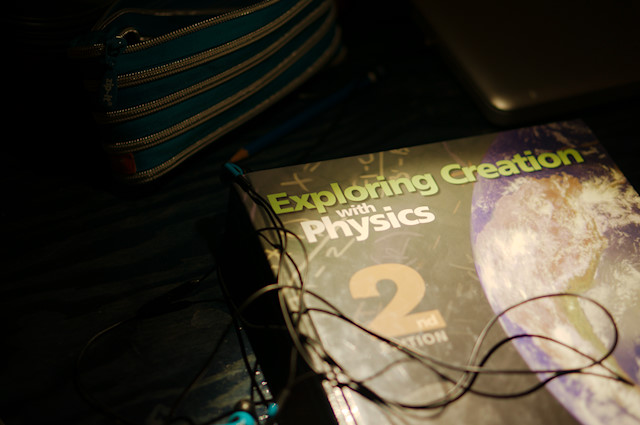
Celine experienced overwhelm. There were tears. And we re-assured her that learning how to work through those experiences was as important as the subject matter. We had complete confidence in her, we know this girl. But we can't take any credit, she does all the work. She figured out "the system" and now we don't hear much about physics.
Damien has been the go-to parent for this endeavor because I never did like physics, it was my least favorite science. I adored biology, and still do. I am looking forward to Laurent's high school science because I'm guessing this is the direction he'll go.
All homeschooling is non-standard to some degree or another; but not tracking with the grade mentality is a little further off the beaten track.
If you choose to step off the conveyer belt model of education there are always questions coming from within or without (or both) about how the kids will integrate into the system.
And really, what people want to know is will these kids have "what it takes"? Will they be too far "behind"? Can they "catch up"? Will it be too hard to catch up? If they don't learn to study as young children how will they build "study" skills? Oh, and my favorite, how will they develop discipline? A question I answer in this blog series.
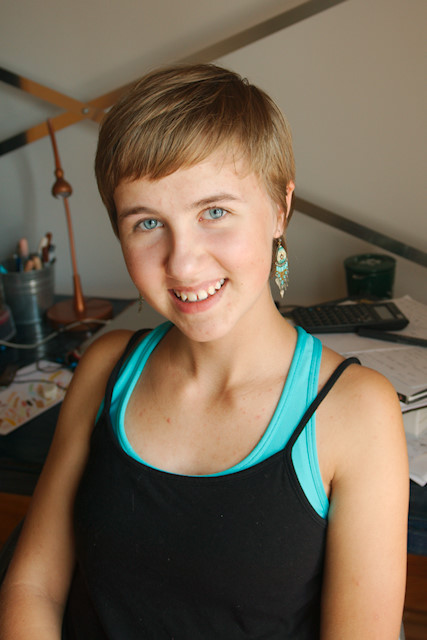
I am not setting us up as the example. Every homeschool family does it differently.
We are behind, we are ahead, we are very average. My children are not precocious.
My point is simply this: you can choose to create your own system. A system based on phases of growth and development, not grades; a system defined by family values and learner needs; a system that allows for diversity and variation.
And this alternative way of doing things can raise learners who are competent and curious enough to take on challenging leaps in grade level.
Written with permission and editorial input from Céline.
This post has affiliate links.
Filed Under
Resource Library
-

Anna on March 29, 2016, 5 p.m.
Great post, confirming my hopes. Makes me a bit sad I didn't homeschool my older kids, making up for it with the younger one though.
-

Francie on March 29, 2016, 6:25 p.m.
Great stuff. These posts must take a lot of work to pull together, but they are always a pleasure to read and are so helpful and reassuring.
-

renee on March 30, 2016, 1:05 p.m.
Hi Francie,
They are a lot of work but I like writing it. This is the stuff I wanted to read when our kids were younger. I wanted to know "how" exactly things worked out when you choose an off the beaten path homeschool track. It's a long post, I don't know how to make them any shorter because I want to be comprehesive. I appreciate you reading it.
-

Francie on March 30, 2016, 1:57 p.m.
When the reader is hungry for the content and the writer knows how to make it flow (and you certainly do), length can be seen as an asset rather than a liability. I was sorry to reach the end! :)
-
-
-

Nancy on March 30, 2016, 2:11 a.m.
Awhile back, there was a comment floating around on Facebook that instead of asking kids what they want to be when they grow up, we should ask them, "what problem do you want to solve?" That made so much sense to me, and really stuck with me.
-

Natalie on March 30, 2016, 6:08 p.m.
Yes! Thanks for this! This IS the stuff I want to read. My own children are only eight and six, but we seem to have a similar homeschooling philosophy. We have been soaking up these relaxed younger years. I know they will pass quickly!
-

Sharla on March 31, 2016, 1:56 a.m.
I love your posts, and I think it's because you put into words so many of my thoughts and hopes and philosophies. Thank you for taking the time. It is so appreciated.
-

Rachel on March 31, 2016, 7:26 p.m.
I echo the sentiment of thank you. Freedom is such a great gift that accompanies homeschooling, but I think it takes courage to embrace that freedom and think outside the box/structure, which you are doing. My children are in 4th and 6th grades and reading your perspective of the high school years is a treasure. To me there has been a (intentional) relaxed aspect to our schooling, but as the children age it is easy to let worry and anxiety seep in thinking about prepping for college and adulthood. However, I do think the non-stresss approach which motivated us to homeschool our children in the beginning should also guide us as they age. This post encourages me!
-

treen on April 5, 2016, 8:31 p.m.
My oldest is turning 10 and in Year 5, and since I think in Trivium, years 5-8 are "middle school." So we're starting to transition her to ... I don't even know how to explain it ... the next level past playing all the time, and all of her schoolwork is reading. And yes, my kids are way behind in math, which gives my husband the jitters because he's insisting on calculus and upper level sciences. I've been digging around for posts about middle school and high school to try to get my feet under me, so this is perfect timing! And it's even about upper level math and science! Yay! Thank you!
-

Amy on April 20, 2016, 7:41 p.m.
Thank you for this. It speaks hope to my heart.
-

Amanda on April 22, 2016, 3:12 a.m.
As the homeschooling mama of five children with the firstborn finishing ninth grade now, I thank you! This is my philosophy as well and what an incredible encouragement this was!
-

Rebecca on Sept. 9, 2016, 6:25 p.m.
I am inspired by you story of Celine using Khan. I have a 10th grader (who just started homeschooling last year) that is behind in math because our public school is behind. Not to mention, I've found most homeschool curriculums are ahead!
We used Monarch and Math Essentials last year. Monarch confused her, and ME left her at a loss when some videos were left out.
We've started Easy Peasy Geometry this year, and she's again, feeling confused. She LOVES Khan Academy. BUT- is it enough to be considered a full credit course of study, a stand alone program?
Thank you so much for your advice!
-

renee on Sept. 11, 2016, 12:34 a.m.
Rebecca, I honestly don't know. I feel it depends on your goals. If my kids were planning to take a science or math dependent discipline in University I would look into it more. As it stands, that's unlikely, and so for Celine's I feel comfortable that Khan has provided sufficient scope and sequence.
-
You can subscribe to comments on this article using this form.
If you have already commented on this article, you do not need to do this, as you were automatically subscribed.






Nana on March 29, 2016, 1:32 p.m.
I'm so proud of Celine: gifted in tenacity, calmness, deep character and more who is applying her intelligence through your "kind-of-fluid" educational methodology. Okay - I'm proud of the teacher(s) too. (smile!) xo Nana